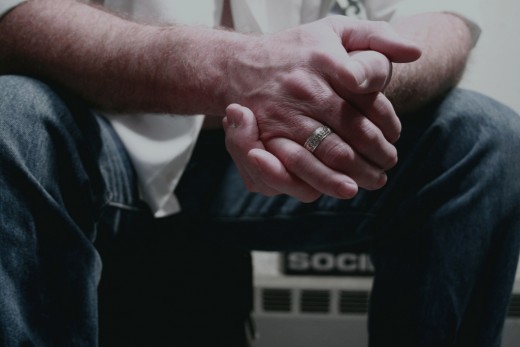My Son Becoming A Man: What Manhood Means To A Woman
Though I grew up without a father, I’ve now shared my life with a wonderful man for nearly twenty years, and I am watching my teenage son begin to take up the mantle of manhood. It has resulted in some thought about what being a man means. This hub is about what manhood looks and feels like from the perspective of a woman. Men are mysterious creatures to a woman. I've come to the conclusion that masculinity is a powerful force: it has the potential to become dark and violent, but that very same energy drives men to take charge, stand up for right, and insist on integrity in personal relationships.

About a year ago I posted the Facebook status update, “Before my eyes, the boy becomes a man,” with a photo taken during a lacrosse game. My son, with possession of the ball, sprints down the field, other players in pursuit, but no one close enough to threaten his mastery of the situation. At the time I didn’t even consider how this very major change would reorganize the family system.
An incident about 4 months ago showed me that a line had been crossed. We were at the orthodontist’s office, and I was absorbed in talking to the receptionist. We were nearly at the end of the two year journey of getting braces and paying for them. The physical side of things was all good, leaving just the financial part. Parents don’t know exactly how much they will pay in the end, we had switched insurance carriers two thirds of the way through, and the situation for me was a bit tense. There weren’t clear answers since the insurance was still processing the claims. In the middle of this exchange, my son butted in with the random comment, “Mom, your lipstick is all over.”
Everyone ignored this comment. The receptionist and I wrapped up, and we left for the car. Halfway down the steps, my emotional response kicked in. I’d just been put down in front of other adults by a male who was significantly taller than me. It wasn’t embarrassing the way my child insulting me in public would be: it was humiliating. I found myself flushing, and having difficulty speaking. I unsuccessfully tried to pretend all was well. I wasn’t responding like a mom to a boy, I was responding as a woman does to a man.
In the car, my son said he was sorry, and I mumbled, “It’s OK.” This is where my son took control of the situation. He leaned in towards me; put his hand kindly yet firmly on my neck. “What I said is really getting on you, Mom. It’s not OK. I’m sorry.” And just like that, I felt better. He had just fixed the situation. The observation that men are “fixers” while women are “empathizers” often takes the direction of trying to teach men more empathizing skills, but for me the great thing about men is they have an uncanny ability to fix things. I know there are clueless, disconnected men who wreak havoc trying to knock their families into shape, but that's not what I'm talking about. I'm talking about the masculine ability to identify a problem, settle on a solution, and implement it. I'm talking about men who know how to carry the day.

This ability won me over during courtship with my husband. I was still in my early twenties, but had talked marriage with two boys previously. My experience in both relationships was the male was flummoxed when the woman got upset. Deer in the headlights. The first time some issue arose in this new relationship I expressed my distress and annoyance, and the familiar silence descended. I thought it was the same old, same old, but he was just pausing to gather his thoughts. He leaned in, secured eye contact and began, “This is the problem…” And then he continued, “We could either do this, or we could try that.” That was the moment I knew I would be safe married to him. He could fix things.
There's a positive energy in masculinity, but there is a dark side too. One of my painful early experiences with a violent man rose up in mind this past fall, in response to an incident on my son's lacrosse team. He joined an indoor lacrosse league, and one Sunday my husband returned from the game to tell me a fight had broken out between our team and their opponents. Our son wasn’t involved, which isn’t surprising: though lacrosse is known for rough behavior, in six years on the field he never committed a deliberate foul. Only later, when I read my husband’s blog post about the incident, did I realize the truth. It was not a fight: it was a planned and executed payback.

A player on the opposing team was playing aggressively, even for lacrosse. An indoor lacrosse field is enclosed in high, thick Plexiglas. The fans get a nice close view of the play, but are safe from hurtling bodies and lacrosse balls. I’m not exaggerating about the flying bodies: the players propel each other into the clear wall while running, so that these big athletic armored youth hit that wall with a resounding slam. Usually no one is hurt, and if taken in the right spirit it can all be exciting, if a little scary. But this one player on the opposing team drove one of our players forcefully into the wall, keeping his stick jammed into his victim’s ribs during impact. Our player staggered off the field and sat the bench, clutching his midsection. The pain was bad enough to make him think his ribs might be broken. As play resumed, two of our players broke formation. They were no longer in this game: they had another plan. They caught the offending opponent player between them, slammed him onto his back, yanked his stick out of his hands and his helmet off his head, and, standing over him, proceeded to slap him repeatedly around the head. The referee blew his whistle and ran to them, waving his arms, but the rules forbade referees from touching players, and this referee did not violate the rules. They were of course thrown out of the game, and had to leave the game area swiftly, but this did not surprise them. They were unrepentant.

When I heard this story, the core of my body went cold. I was afraid of this world my son was in, a male domain of violence and retribution. The incident also eerily resembled a disturbing incident from my own childhood. On an extended visit to a friend’s home I witnessed the father throw his wife to her back on the floor, and strike her repeatedly in the face. In the aftermath, he refused to comfort his sobbing daughter. He was unrepentant.
I was a child when this happened, and when I returned home after the visit, I didn’t talk about it. I had no words. Oddly enough, I didn’t even have emotions. Though I remembered the details vividly, the poor woman’s moans and her spasmodically jerking leg, feelings did not attach to the memories. I have been told this is a symptom of Post Traumatic Stress Disorder. But feelings have seeped around the edges, and at times my adult self experiences panic in the face of male aggression.
This was one of those times. I was afraid for my son. He was strong and fast, but his athletic skill would not protect him from such an ambush, and I saw the referee would not use physical force to protect players from each other. I felt lost in that world, that world of masculine domination, where the strong might beat whomever they chose.
When I told my husband this made me afraid for our son’s safety, he disagreed. “No, he’s safer now than ever. Believe me, this story will get around. Who will try a dirty move on him, when he has those guys covering his back?”
I experienced that long ago violence as a child: to me it was unexpected and random, and at times I instinctively saw males as randomly violent creatures. But this latest incident was anything but random. If anyone watching had any doubt about the reason for the ambush, the two perpetrators announced their motivation by leaving the field with their heads held high, their injured teammate supported between them. The injured player was out for the rest of the season, but their actions declared their solidarity with him, and served up a warning to anyone else who would dare abuse one of their teammates. While the unrepentant attitude of the abusive husband from my childhood further frightened his family, the unrepentant demeanor of the lacrosse players declared their protective stance beside their teammate. The surface similarity gave me that initial chill, but I came to see the two incidents as very different from each other.
All of this is a story taking place in a man’s world. You will simply never see two women dish out this kind of physical beat down in defense of a friend. Nor does anyone approve of a man who settles a conflict with a woman by smacking her. Male physical aggression has its dark side, and I experienced that young. But these two young men used their physical aggression to enforce a code of justice. And I think some other details support the idea that the other men involved backed up the avengers. The attacked player’s team did not come to his aid; he had made a string of dirty moves before this incident, and his own team may have tired of it. The two players were severely warned, but they were not banned from the league or the sports center. In fact, they returned for the very next game. Lastly, I think if two lacrosse players manhandled a woman in the same way, the referee would have laid hands on them to defend her, rules or no rules. His adherence to the rules in this case can be read as an acceptance of their brand of justice.
All of this has made me reflect on my own relationships with men, and my feelings about them. How does a boy become a man? Observation is important, but I think somehow it is inside him too. My husband grew up unfathered, and blossomed earlier than many peers into manhood. How did my son know how to repair his relationship with me? I’m not sure. He still behaves like my child, expects me to take care of his needs and so forth. But I sense a new gentlemanliness in his treatment of me. I don’t think he is imitating how his father treats me. It reminds me more of how my husband treats his own mother. I’m not sure where men get this script: how to treat my wife, how to treat my mother. But the men in my life have an uncanny ability to get it right.
More links
- Understanding Men: Advice For Women
I’ll start this out by stating my qualifications. I’ve been married for 20 years, and my husband consistently says he is happy. Sometimes he’s even thrilled. It's true he is a naturally cheerful person, but I like to take some credit anyway. ... - The Power of Sexual Intimacy
This essay began as a comment on another hub, and when it grew over 500 words, I decided to craft it into a hub of my own. The piece I read is titled “The Truth About Abortions,” by James Watkins, a hub not surprisingly about abortion. I found... - Building A Strong Mother/Daughter Bond Through Fashi...
About my relationship with my daughter, and my own relationship with mother figures. - Parenting With Chronic Pain
More about me and my son.








